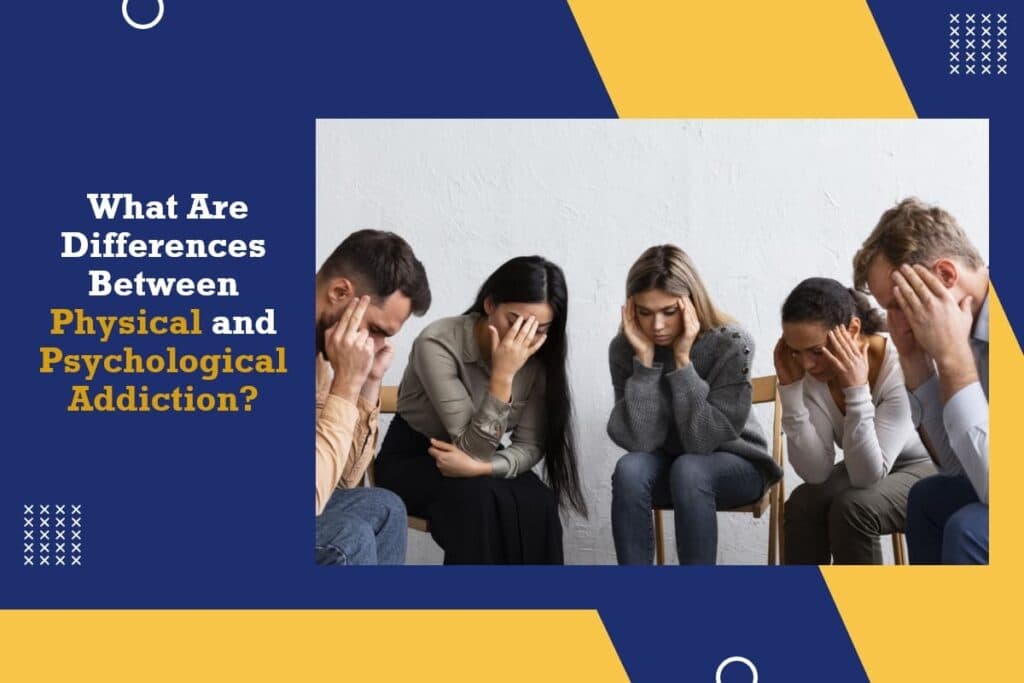What Are The Differences Between Physical and Psychological Addiction?


When we hear the term addiction, we often associate it various substances such as drugs, tobacco, alcohol etc. It may also be to certain activities such as gambling, internet gaming, excessive social media usage etc. Let us see, what exactly is the meaning of addiction.

Addiction can be defined as not having control over what one is doing. It includes consumption of substances or something to a point that it could be harmful to you. Addiction can be treated and a healthcare facility like Jagruti Rehab Centre.
According to the ASAM (American Society of Addiction Medicine) Addiction is a treatable, chronic medical disease involving complex interactions among brain circuits, genetics, the environment, and an individual’s life experiences.
People with addiction use substances or engage in behaviours that become compulsive and often continue despite harmful consequences. There are various causes of addiction such as a family history, history of trauma, peer pressure, lack of involvement of family, an underlying mental health disorder, taking a highly addictive drug etc.
It is essential to understand the root cause of such addictions to provide the right treatment to help a person get rid of it. Addiction is characterised by 4’C’s : compulsion, consequences, control and cravings. They can be broadly categorised into chemical addiction and behavioural addiction. There can also be various types of addictions such as alcohol, drug, smoking, prescription drugs, heroin etc.
Difference between physical and psychological addiction
Physical Addiction:
An addiction in which a person consumes a particular substance or drug over a period of time and experiences unpleasant physical symptoms of the drug when abruptly stopped.
Example: Alcohol and tobacco
- This is usually seen in drug addiction. Tolerance and withdrawl are a common feature in this type of addiction.
- It leads to trembling and pain with the withdrawl of the substance.
- The brain craves for the reward of the substance. This happens because the brain reward system is stimulated intensely.
- Intense cravings are often seen in these types of addictions.
- There are strange patterns in the behaviour.
- Feeling of euphoria
- The difference between physical and psychological addiction is that in physical addiction the actual symptoms are experienced. It may be due to excessive caffeine use which may not be as harmful. However, it can also be to something more potentially harmful such as cocaine.
- Physical addiction manifests itself as pain and sickness if that drug is not consumed.
- The degree of intensity of withdrawl symptoms may vary from mild, moderate to severe.
- The range of effects could also vary between experiencing sleep disorders or tiredness to more severe ill-effects such as Delerium Tremens and seizures.
- Only drugs containing nicotine can cause physical addiction.
- However, if a certain drug has no inherent addictive properties, it can still cause an addiction if used in an uncontrolled manner.
Psychological Addiction:
In psychological addiction, we do not see any withdrawl symptoms. The individual experiences a preconceived need to indulge in the usage of that substance. Best mental hospital in Mumbai such as Jagruti Rehab Centre provides the right treatment modalities for this kind of addiction.The part of the human brain associated with psychological addiction in ‘Nucleus accumbens’.It is responsible for the feelings of pleasure and recreation of pleasure. It makes the individual indulge in compulsive behaviour resulting in complex and strange behavioural patterns.In psychological addiction, there is a mental need rather than a physical need for the drug or substance.A mental craving is a hallmark of psychological or mental addiction. When we speak about physical v/s mental addiction, physical addiction is usually seen with substances such as heroin and metamphetamines. Psychological addiction is usually seen in Marijuana users
Physical v/s psychological dependency
Physical dependency:
The body requires higher level of the drug to keep the symptoms from showing up.The grave consequences are blackout or an overdose.Various symptoms are: anxiety, panic attacks, paranoia.Serious withdrawal symptoms are experienced.Insomnia and other sleep disorders.Feeling of hopelessness.Delerium TremensDepression.
Such dependency can also be fatal. You can choose the best mental hospital in Chennai if you wish to save someone near and dear to you from such a physical dependency.
Psychological dependency:
It is the dependence on the substance mentally or psychologically.Though it is often misunderstood as the fact that it makes a person feel calm, it is actually the opposite. It results in anxiety and nervousness.Signs of psychological dependency are:
-Depression
-Change in appetite
-Restlessness
-Frustration
-Cravings
-Uncertainty about being able to get over the dependence of the substance.
-Trying to find more similar substances.
-Denial
-Dismissing behaviourIn psychological dependency, the intensity of these symptoms may vary from person to person.It is often influenced by the lifestyle of that person as well as the environment he is living in.Psychological dependency is often more difficult to deal with as compared to physiological dependency. It can be a very distressing. Even if the consumption of that substance is stopped, it is not within the body, however tackling the psychological aspect of it can be indeed difficult.
Be it any type of addiction, it is necessary that the individual should receive the right treatment along with good support from the family only then can he or she come out of that addiction. One can be rest assured about being in the best hands while seeking treatment at Jagruti Rehab Center for such addictions.
Book a Confidential Consultation with Our Experts
Our team of medical professionals is there to hear and guide you towards the right treatment plan. Get the right professional advice, instant support and confidential consultations with recovery plans especially tailored to your needs.











